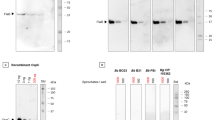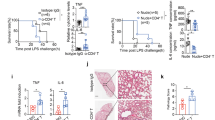Abstract
Current thinking emphasizes the primacy of CD14 in facilitating TLR recognition of microbes to initiate proinflammatory signaling events and the importance of p38-MAPK in augmenting such responses. Herein, this paradigm is challenged by demonstrating that recognition of Borrelia burgdorferi not only triggers an inflammatory response in the absence of CD14, but one that is uncontrolled as a consequence of impaired PI3K/AKT/p38-MAPK signaling and negative regulation of TLR2. CD14 deficiency results in hyperphosphorylation of AKT and reduced activation of p38. Such aberrant signaling leads to decreased negative regulation by SOCS1, SOCS3, and CIS thereby engendering a more severe and persistent inflammatory response to B. burgdorferi. Perturbation of this CD14/p38-MAPK-dependent mechanism of immune regulation may underlie development of infectious chronic inflammatory syndromes.
Similar content being viewed by others
Article PDF
Author information
Authors and Affiliations
Rights and permissions
About this article
Cite this article
Sahay, B., Patsey, R., Whatley, N. et al. CD14 Modulates PI3K/AKT/p38-MAPK Licensing of Negative Regulators of TLR Signaling to Restrain Chronic Inflammation. Nat Prec (2008). https://doi.org/10.1038/npre.2008.2005.1
Received:
Accepted:
Published:
DOI: https://doi.org/10.1038/npre.2008.2005.1



